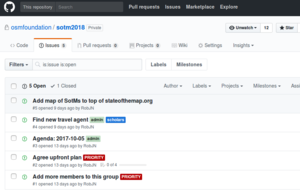State of the Map/Planning/Working as a team
Fining a balance between enough communication to keep the project moving forward and too much communication so that team members are overwhelmed is an ongoing challenge. For organising the international State of the Map we have members spread across Europe, America and the host country. The following is what we have found to work well.
Meetings
| Pros & cons of meetings |
| Advantages |
| * Enables decisions to be made more quickly. |
| * Keeps the project momentum and team spirit. |
| * Provides an opportunity to ask questions and have an open discussion. |
| * If audio/video based, it reduces the chance of being misunderstood. |
| Disadvantages |
| * Limits participation to only those who can speak the main language. |
| * Can be a challenge to find a time that works for everyone (especially when the volunteer base is globally spread). |
| * Is not well suited to people who prefer to take tie to formalise their thoughts. |
| * Can clash with people's work/social life. |
| * Needs to be minuted otherwise decisions are lost. |
Having a regular meeting provides a number of benefits but also includes some challenges. As such we find that regular meetings are of most use at the beginning of planning (to increase momentum and allow for questions) and in the last few months before the event (to enable quick decision making and reduce the chance of being misunderstood. In the middle period it is possible to have fewer meetings (e.g. once a month).
All meetings should be minuted so that those who were unable to attend (or found it difficult to understand the language) have good records of the meeting.
GitHub
Although traditionally for managing software development, GitHub also makes a great tool for keeping track of team actions. We use the "Issues" feature of GitHub to track our tasks. You can assign people to tasks, comment, add a label (e.g. "URGENT") and attach files.
We have found these labels (which match the categories in our timeline) work well and copy them from year to year via this online tool (create a "Personal access token" in GitHub rather than using your actual password).
Our GitHub repos (private, requires log-in using authorized account):
https://github.com/osmfoundation (private)
Slack
Slack is an instant messaging system where you can have one-to-one conversations or group conversations. It is also possible to get notifications from GitHub (and others, such as Twitter) shown in Slack.
It works best when it is used for more informal discussions and maintaining team spirit. Make sure that any decisions are minuted (e.g. recorded in GitHub) and that all people are given an opportunity to comment. Avoid developing a culture where the working group feels pressured to always be active (24/7 contact can be stressful).
https://osmfoundation.slack.com/ (Private access to some SotM channels)
With the team
We do NOT recommend using email for planning - it is not a good way to track actions or keep records! Email is however useful as a back-up or in case you need to highlight a particular topic that needs further attention.
It is also useful for those team members that need to communicate externally (e.g. those in contact with potential sponsors and for dealing with general enquiries).
To do: Add mailing addresses.
With the board
The OpenStreetMap Foundation (OSMF) board provides the State of the Map working group a lot of independence to make decisions as it best sees fit. For major decisions (big budget items, new ways of working, etc) the board should be notified by email. It is recommended that a member of the board is also on the State of the Map working group so that he/she can act as link between the two groups.
The OSMF board has access to our GitHub and Slack groups.
